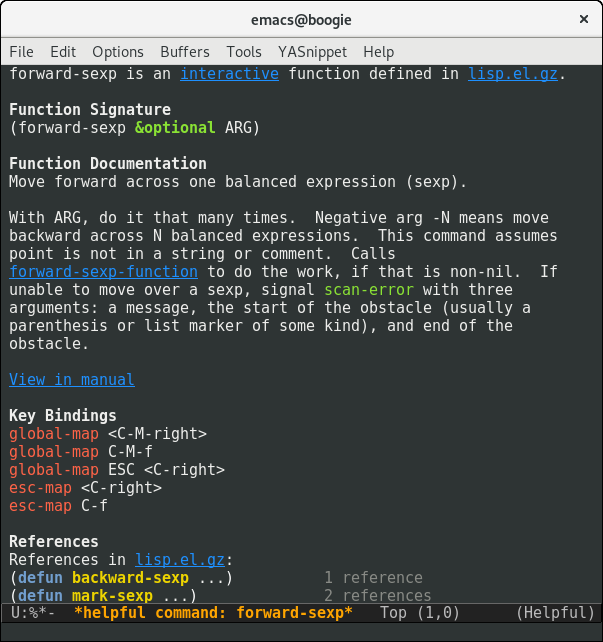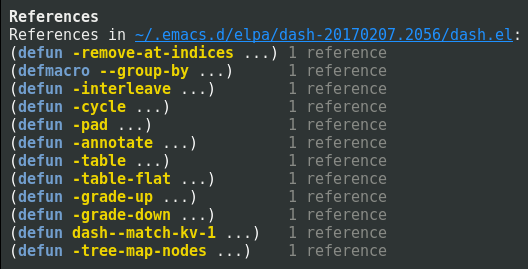Helpful is an alternative to the built-in Emacs help that provides much more contextual information.
Install from MELPA, then call one of the following commands:
helpful-callablehelpful-functionhelpful-macrohelpful-commandhelpful-keyhelpful-variablehelpful-at-point
If you want to replace the default Emacs help keybindings, you can do so:
;; Note that the built-in `describe-function' includes both functions
;; and macros. `helpful-function' is functions only, so we provide
;; `helpful-callable' as a drop-in replacement.
(global-set-key (kbd "C-h f") #'helpful-callable)
(global-set-key (kbd "C-h v") #'helpful-variable)
(global-set-key (kbd "C-h k") #'helpful-key)I also recommend the following keybindings to get the most out of helpful:
;; Lookup the current symbol at point. C-c C-d is a common keybinding
;; for this in lisp modes.
(global-set-key (kbd "C-c C-d") #'helpful-at-point)
;; Look up *F*unctions (excludes macros).
;;
;; By default, C-h F is bound to `Info-goto-emacs-command-node'. Helpful
;; already links to the manual, if a function is referenced there.
(global-set-key (kbd "C-h F") #'helpful-function)
;; Look up *C*ommands.
;;
;; By default, C-h C is bound to describe `describe-coding-system'. I
;; don't find this very useful, but it's frequently useful to only
;; look at interactive functions.
(global-set-key (kbd "C-h C") #'helpful-command)Ivy users can use Helpful with counsel commands:
(setq counsel-describe-function-function #'helpful-callable)
(setq counsel-describe-variable-function #'helpful-variable)Helpful will try really hard to show the source code. It shows the source code for interactively defined functions (unlike the built-in Help) and falls back to the raw sexp if no source is available.
Helpful will show you where a function is being called!
Docstrings in helpful:
- Highlight the summary (the first sentence)
- Include cross-references to other functions/variables
- Linkify references to Info nodes
- Hide superfluous punctuation
If a symbol is also documented in the Info manual, helpful will provide a link to the relevant section too.
Helpful will show you the properties that have been applied to the current symbol. This provides visibility of features like edebug or byte-code optimisation.
Helpful will also highlight any symbol aliases.
Helpful provides a separate helpful-command function, for when you
just want to view interactive functions.
Helpful displays any keybindings that apply to interactive functions.
You can trace, debug or disassemble functions from inside Helpful. This is discoverable and doesn't require memorisation of commands.
If a function has multiple aliases in Emacs, Helpful will show all of the aliases defined.
This project has been heavily influenced by:
- help+.el, help-fns+.el, help-mode+.el
- Dave Williams' demo of Lucid's Energize
GPLv3+.
I am providing code in the repository to you under an open source license. Because this is my personal repository, the license you receive to my code is from me and not my employer.








